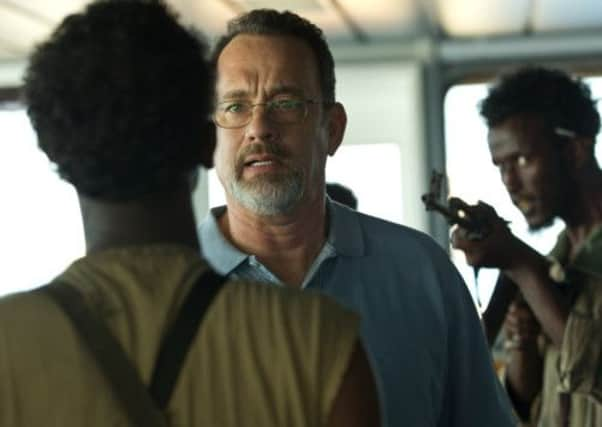Captain Phillips combines complex issues with Hollywood thrills


As Somali pirates advance on a US container ship, its captain (played by Tom Hanks) can be seen calmly but forcefully instructing his crew to crank up the engine to a level that might just allow them to outrun their pursuers, but might also blow said engine apart.
This pushed-to-the-limit sweet spot (where control can give way to chaos at any second) is pretty much where Greengrass – the man who helped redefine the action movie with The Bourne Supremacy and The Bourne Ultimatum – likes to operate as a filmmaker.
Advertisement
Hide AdIt informs the caught-on-the-fly visual style for which he’s become famous, and it reflects the rapidly changing state of the world in which the characters in his films – be it Phillips, Jason Bourne, the ground troops in Green Zone or the doomed passengers of United 93 – find themselves
But this impulse, he thinks, is also part of a more instinctual desire to recapture the sensorial overload he felt as a child whenever his dad took him to the pictures to see David Lean films.
“I think that early experiences of the cinema are fundamental,” says the 58-year-old director. “I didn’t have anything in my family background that suggested I’d become a filmmaker. My mum was a teacher and my dad was at sea, which had some bearing on me doing this film, but not on becoming a filmmaker.”
Nevertheless, he vividly remembers watching Doctor Zhivago with his dad and being struck by the famous scene of the Cossacks attacking a peaceful demonstration. “The sense of outrage and fear and shock and spectacle was overwhelming. But ultimately it was the sense that Zhivago knows he will be at the mercy of these awesome forces that are being released in the streets below him that got me. That’s history and he’s going to bob like a cork in the turbulence of it. And that, I suppose, as a vision of what the world is like, has never left me.”
It’s certainly evident in Captain Phillips. Based upon the widely reported real-life ordeal its eponymous protagonist went through in 2009 when he was taken hostage by Somali pirates, it’s a film that taps into the globalised desperation of the world in the aftermath of the financial collapse. “It’s also a crime story, most importantly,” interjects Greengrass. Indeed, that’s what appealed to him most: that it was a) about an innocent man getting caught in the middle of an attempt to steal a ship that was using the trade routes through which the wealth of the world continues to be moved, and b) that the criminals hijacking the ship were outside this economic world.
“You do get a classic crime story paradigm,” elaborates Greengrass. “You get the foreground, which is clear: this is the innocent man and this is the criminal; this is the crime and these are the consequences. But that clarity rubs against the moral ambiguity of the landscape and the fact that the crime reflects the society that gives rise to it.”
Advertisement
Hide AdGreengrass has a knack for not simply making films that engage with this kind of moral complexity but for making them popular too. “Reaching an audience, but without compromising what you’re trying to say has always been what I was trained to do,” he says, referring back to his World in Action days. “That prepared me very well for going to Hollywood.”
Not that he ever expected to end up there. Even when he did go (to make The Bourne Supremacy), he figured it would be a one-shot deal. But having worked within the Hollywood system for a decade he’s concluded that it’s a myth that studios don’t want directors with a point of view.
Advertisement
Hide Ad“They’re hiring you for your strong point of view,” he insists. “There’s huge freedom to be had there as a director.”
You only have to look at the subjects he’s made films about to see that’s the case: 9/11 in United 93, the war in Iraq in Green Zone, the economics of Captain Phillips. His two Bourne films were subversive commentaries on the War on Terror. “They’ve indulged me and I’m very grateful for it,” he says.
It’s rare to encounter a cutting-edge filmmaker happy with the way Hollywood operates, though I’m curious about how he felt about the decision to make The Bourne Legacy. Did he see it?
“Yes, I did see it,” he says. He takes a long pause. “That’s a little complicated for me. I’m very proud of the Bourne movies that I made. In the end, I didn’t want to make another one. So in your heart you sort of wish them well and feel gratitude for what it’s done for you. When they make one that maybe doesn’t work as well, you kind of have to just, well…” He trails off. “You want the franchise to prosper, of course you do,” he says eventually. “But the only one that’s really done it successfully is Bond, in the sense that they’ve kept it going through different eras.”
Speaking of different eras, now that we’re in the age of WikiLeaks and Edward Snowden, it seems incredible that Spycatcher, the controversial memoir Greengrass co-wrote in 1988 with former MI5 Agent Peter Wright, is out of print. “Yeah, it’s odd, isn’t it? In the last year or so I have glanced back and forth and thought, ‘This does feel very familiar.’”
He reckons that if the climate that exists now had existed back then, he’d have been jailed. “It definitely makes me feel how illiberal we’ve become. Even Margaret Thatcher felt constrained by what she could do. I’m sure she’d have loved to throw Peter Wright and anyone that supported him in jail.”
He shakes his is head. “It’s a starker world today, that’s for sure.” • Captain Phillips is in cinemas from Friday